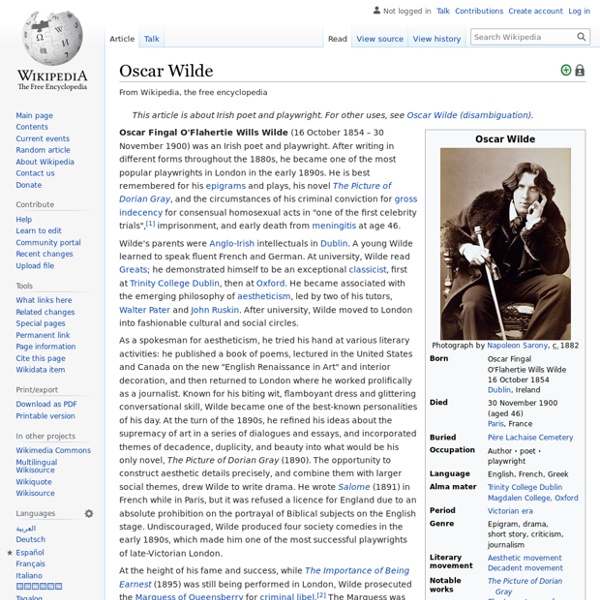Walter Pater
Walter Horatio Pater (4 August 1839 – 30 July 1894) was an English essayist, literary and art critic, and fiction writer, regarded as one of the great stylists. His works on Renaissance subjects were popular but controversial, reflecting his lost belief in Christianity. Early life[edit] Born in Stepney in London's East End, Walter Pater was the second son of Richard Glode Pater, a physician who had moved to London in the early 19th century to practice medicine among the poor. Dr Pater died while Walter was an infant and the family moved to Enfield, London. Walter attended Enfield Grammar School and was individually tutored by the headmaster. In 1853, he was sent to The King's School, Canterbury, where the beauty of the cathedral made an impression that would remain with him all his life. As an undergraduate, Pater was a "reading man", with literary and philosophical interests beyond the prescribed texts. Career and writings[edit] The Renaissance[edit] Influence[edit] Critical method[edit]
Marius the Epicurean (1885) - Valancourt Books
Marius the Epicurean (1885)Walter Pater, Edited by Gerald Monsman"The great English prose work has been written and perfectly written and you and I would do well to lay down our pens. . . . I believe that the worst page of prose Pater wrote is better than the best that anybody else ever wrote." - George MooreSet in the second century A.D. against the backdrop of a Roman Empire on the verge of decline, Marius the Epicurean is the story of the philosophical and spiritual development of Marius, a young Italian serving as amanuensis to the great emperor Marcus Aurelius. Marius explores the various systems of philosophy in search of an elusive vision of love, moving from Epicureanism to Cyrenaicism and finally Stoicism before finally finding what he had sought in the terrible beauty of Christian martyrdom.Marius the Epicurean is the rare novel that is as significant for its style as for its plot.
Marius the Epicurean
Marius the Epicurean: his sensations and ideas is a historical and philosophical novel by Walter Pater (his only completed full-length fiction), written between 1881 and 1884, published in 1885 and set in 161–177 AD, in the Rome of the Antonines. It explores the intellectual development of its protagonist, a young Roman of integrity, in his pursuit of a congenial religion or philosophy at a time of change and uncertainty that Pater likened to his own era.[1] The narration is third-person, slanted from Marius's point of view, added to which are various interpolated discourses, ranging from adaptations of classical and early Christian writings to Marius’s diary and authorial comment. Plot summary[edit] Cupid and Psyche by François-Edouard Picot (1817). Themes[edit] Marcus Aurelius and members of the Imperial family offer sacrifice at the Temple of Jupiter Capitolinus, in gratitude for success against Germanic tribes - an episode described in Marius Publishing history[edit] Trilogy[edit]
The Happy Prince and Other Tales
The Happy Prince and Other Tales (sometimes called The Happy Prince and Other Stories) is a collection of stories for children by Oscar Wilde first published in May 1888. It contains five stories: "The Happy Prince", "The Nightingale and the Rose", "The Selfish Giant", "The Devoted Friend", and "The Remarkable Rocket". "The Happy Prince"[edit] In a town where there are a lot of poor people who suffer, a swallow who was left behind after his flock flew off to Egypt for the winter, meets the statue of the late "Happy Prince", who in reality has never experienced true sorrow, for he lived in a palace where sorrow was not allowed to enter. Viewing various scenes of people suffering in poverty from his tall monument, the Happy Prince asks the swallow to take the ruby from his hilt, the sapphires from his eyes, and the gold leaf covering his body to give to the poor. Adaptations[edit] "The Nightingale and the Rose"[edit] Adaptations[edit] "The Selfish Giant"[edit] "Who hath dared to wound thee?"
The Ballad of Reading Gaol
The Ballad of Reading Gaol (1904) The Ballad of Reading Gaol is a poem by Oscar Wilde, written in exile in Berneval-le-Grand, after his release from Reading Gaol () on 19 May 1897. Wilde had been incarcerated in Reading after being convicted of gross indecency with other men in 1895 and sentenced to two years' hard labour in prison. Wilde wrote the poem in mid-1897 while staying with Robert Ross in Berneval-le-Grand. The poem narrates the execution of Wooldridge; it moves from an objective story-telling to symbolic identification with the prisoners as a whole.[4] No attempt is made to assess the justice of the laws which convicted them, but rather the poem highlights the brutalisation of the punishment that all convicts share. The finished poem was published by Leonard Smithers on 13 February 1898[7] under the name C.3.3., which stood for cell block C, landing 3, cell 3. The poem consists of 109 stanzas of 6 lines, of 8-6-8-6-8-6 syllables, and rhyming a-b-c-b-d-b. Notable excerpts[edit]



